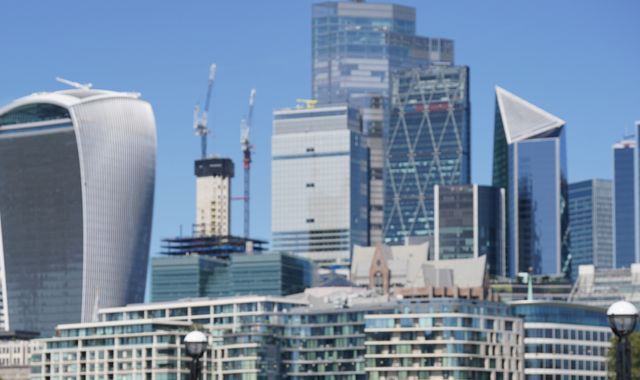FTSE 100 record highs do not reflect a recovery for UK PLC - here's why
23 April 2024, 18:09 | Updated: 23 April 2024, 19:59

The FTSE 100 has hit a second all-time closing high in as many days.
The index of the UK's biggest 100 listed companies, having earlier hit a new intra-day high of 8,075.52 at just after 8.24am on Tuesday, finished the session up 20.94 points, around 0.26%, at 8044.81.
It's worth reflecting it has taken just over a year for the premier index to recapture the summit last achieved when, on 16 February 2023, the FTSE hit the dizzying heights of 8,047.06.
A fair bit has happened since then.
Money latest: Petrol price spikes and 'stealth' raid on Britons' inheritance revealed
When the FTSE last peaked, before this week, the Bank of England's main policy rate - Bank Rate - stood at 4%, with the monetary policy committee going on to raise it a further three times, taking it to the present 5.25% in August last year.
By then, the UK economy had already entered a recession, albeit a very shallow one from which it has, in all probability, now emerged.
Shortly after the FTSE hit its peak in February last year, it surrendered the 8,000 milestone fairly rapidly, slumping to as low as 7,206.82 on 20 March last year as markets shuddered following the rescue of Swiss banking giant Credit Suisse.
It then meandered along for most of the rest of the summer, revisiting those troughs, as concern mounted that central banks around the world would continue to raise interest rates in the face of rising inflation.
As we now know, interest rates had peaked by the autumn, with the US Federal Reserve's last hike coming in July last year, the Bank of England's in August and the European Central Bank's in September. The final quarter of last year saw equity markets everywhere, including the FTSE, rally as investors began to price in interest-rate cuts during 2024.
It's worth noting, though, the FTSE has been a relative laggard this year.
The S&P; 500, America's top stock index, is up 6.91% so far in 2024, Japan's Nikkei 225 is up 12.81% and Germany's DAX 40 is up by 8.30%. The FTSE, by contrast, is up by a mere 4.05% even after the rally of recent sessions.
So it can hardly be said to be doing well compared with its international peers.
On top of those already mentioned, the MIB in Italy is up by 13.24% this year and the CAC 40 in France by 7.46%, for example.
Nonetheless, the FTSE hitting a new record close two days running is notable.
There is no shortage of reasons why.
The most obvious is the recent weakness in sterling. The pound hit a five-month low against an international basket of currencies on Monday following comments from Sir Dave Ramsden, a deputy governor of the Bank of England, on Friday afternoon, in which he pointed to the growing likelihood of interest-rate cuts in the near future.
That has weakened the pound against the US dollar in particular. Since three-quarters of earnings of FTSE 100 companies are denominated in other currencies, chiefly the US dollar, a fall in the pound against those currencies makes the future earnings generated by FTSE companies - whose shares are denominated in sterling - cheaper to buy in those currencies.
That was certainly behind the big rally seen on Monday - although today sterling rallied on comments from Huw Pill, the Bank's chief economist, which suggests there is more going on.
That something is the relative cheapness of the FTSE in comparison with its peers. The FTSE currently trades on a price/earnings (P/E) ratio of just 13.22 times - in other words, £1 invested in the index today would be repaid 13.22 years from now. That is cheap when set against the DAX in Germany, which trades on a P/E of 14.87 times and the CAC in France, which trades on a P/E of 15.91 times or the SMI in Switzerland, which is on 14.52 times.
The main US indices, meanwhile, cavort along on P/E ratios of more than 20 times. Only Spain's leading stock index, the IBEX, looks cheaper than the FTSE by comparison.
The conclusion that should emphatically not be drawn is that the FTSE's recent rally is anything to do with the UK's economic outlook, even though the latter is visibly improving.
The index is chock-full of companies that have little or nothing to do with the UK - such as Fresnillo, a Mexican gold and silver miner; Antofagasta, a Chilean copper and gold miner and Ashtead Group, a plant and tool hire company which derives £90 in every £100 it earns from the United States.
Even companies thought of as British, such as BP, Rolls-Royce, BAE Systems, Shell and Diageo, the world's biggest scotch whisky and tequila producer, derive the vast majority of their earnings outside the United Kingdom. In fact, of the 20 biggest companies in the FTSE, only one - the Lloyds Banking Group - can be said to make most of its income in the UK.
For a better gauge of how corporate Britain is doing, investors are better off looking at the FTSE 250, the next biggest 250 listed companies on the London Stock Exchange and home to household names such as Bellway, Games Workshop and ITV.
Some of these also derive a fair chunk of earnings from outside the UK, such as the cruise operator Carnival, the ingredients producer Tate & Lyle and the catalytic converters group Johnson Matthey. But it is also replete with companies that make most or all of their earnings in the UK, such as the property trio British Land, LondonMetric Property and Derwent London, the housebuilder Bellway and everyone's favourite sausage-roll emporium Greggs.
In short, the FTSE 250 is a much better guide to sentiment towards UK companies than the FTSE 100.
The bad news is that it is only up by a paltry 0.6% this year so far.
(c) Sky News 2024: FTSE 100 record highs do not reflect a recovery for UK PLC - here's why

























